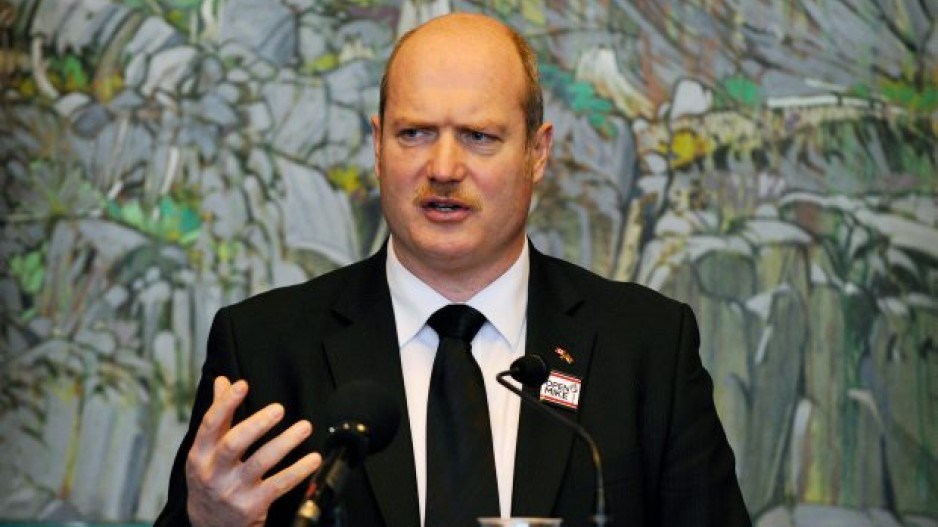A diversified economy and “disciplined fiscal management” has helped put British Columbia in the enviable position of not only balancing its budget for the fourth year in a row, but also having enough of a surplus to create a new long-term savings account, the Prosperity Fund.
Lower debt and increasing revenue, not a liquefied natural gas industry, will seed B.C.'s version of Alberta's Heritage Fund.
LNG projects that were expected to be in the works by now have been deferred, so the government has yet to start collecting royalties and taxes.
But whittling away at the provincial debt has freed up $500 million in debt servicing costs over a three-year fiscal period.
That and a $377 million surplus for the 2015-2016 fiscal year will allow the government to seed the new Prosperity Fund with $100 million.
“We are paying down and reaping the benefit of reduced debt servicing costs,” B.C. Finance Minister Mike de Jong said in a pre-budget speech briefing February 16.
“The notion that we would take a very modest amount of money out of our chequing account and put it into savings account is one that, I think, makes sense.”
A minimum of 25% of the prosperity fund's annual earnings will be plowed back into the fund. Fifty per cent will go to debt retirement. The balance will be used to fund core government services.
The fund will be topped up with revenue from the LNG industry, should it ever take off.
Asked if the government wasn't putting the cart before the horse in setting up the fund without any revenue from LNG yet, de Jong said he was confident that there will be an industry in B.C.
“I'm not nearly as pessimistic about the prospect for LNG as apparently some are, particularly given the investments that have taken place and the work that has been done,” he said, a reference to the $12 billion that energy companies have already invested in B.C. to lay the groundwork for LNG.
Compared with most other provinces, B.C.'s finances are in good shape, despite falling revenue from natural resources, although some of the government's assumptions are vulnerable to what de Jong called “a measure of economic uncertainty in some of our trading partners in North America and elsewhere.”
B.C. is one of only two provinces, the other being Quebec, that will balance its budget, and the only province that can still boast a triple AAA credit rating, de Jong said. It also has the lowest debt-to-GDP ratio in Canada.
“We are leading the country in economic growth,” de Jong said. “We are regularly posting budgetary surpluses.”
Revenue from mining, oil and gas and forestry is down dramatically, but has been offset by increased consumer spending, continued growth in the real estate sector, and employment growth.
Real estate, retail, tourism, and the film industry are sectors that have experienced particularly strong growth. Falling revenue from the resource sectors is also being offset by increasing taxes and fees, such as the Medical Services Plan.
Retail sales have been a key economic driver for B.C., with a 6.8% increase since November 2015. Employment is exceeding growth projections of 1.2% growth in 2015.
The government forecasts the B.C. economy will grow by 2.4% in 2016, 2.3% in 2017 and 2.3% in 2018, and it is forecasting modest surpluses over the next three fiscal periods.
Going forward, the provincial budget includes $1.6 billion in new spending over three years, and $12 billion in capital spending for infrastructure spending, including $3.1 billion for transportation projects.
The budget also includes spending for certain targeted sectors of the economy: $1 million to help attract international shipping companies to B.C. and another $1 million to support the aerospace sector.
Another $5 million is being earmarked for promotional campaign aimed at selling more B.C. wood and lumber products in India.
Revenue from natural resources plunging
A prolonged commodity price plunge has taken its toll on key sectors of B.C.'s economy, and government taxes and royalties along with it.
Natural resource revenue is projected to drop 7.2% in 2016-2017, as a result of lower Crown land sales and low commodity prices. Natural gas revenues are projected to decline 15.2% in 2016-2017.
In total, revenue from energy, metals and minerals is expected to drop from $1.2 billion in the 2015-2016 fiscal period to $825 million by 2018-2019.
Over the next three years, revenue from the sale of Crown land tenures is forecast to decline 65% from $767 million in 2015-2016 to $268 million in 2018-2019.
The government is counting on metallurgical coal prices rising from $95 per tonne to $138 per tonne by 2018, and copper prices increasing from $2.36 per pound to $3.




